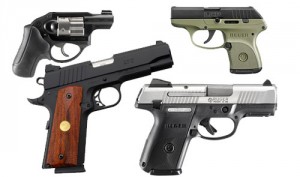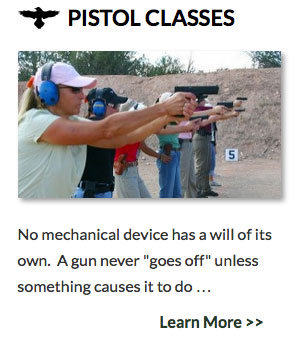Widgetized Section
Go to Admin » Appearance » Widgets » and move Gabfire Widget: Social into that MastheadOverlay zone
I Want to Buy a Gun – Which Gun Should I Buy?
 What gun would you recommend for me? Stacey and I are asked this question at least once a week. The person asking the question is probably expecting a simple answer, such as, “the perfect gun for you is the ‘Spaceman 2500’.”
What gun would you recommend for me? Stacey and I are asked this question at least once a week. The person asking the question is probably expecting a simple answer, such as, “the perfect gun for you is the ‘Spaceman 2500’.”
Instead, we start by asking the “potential gun buyer” (PGB) some questions. “I want to build a house, which tool should I buy?” The PGB will usually just give us a blank stare. “Which hammer should I buy?” Another blank stare will usually follow. Then we will explain that a gun is a tool, much like other tools. Each tool is designed to do different jobs. If you are building a house and framing walls you do not want a tack hammer. If you are installing molding you do not want a sledge hammer.
Asking, “which gun should I buy,” is like asking which car should I buy? If you are 6’7” you probably do not want to buy a subcompact. If you haul hay for your horses you probably do not want a sports car.
I once received a call from a friend (Don) who asked me what firearm he should buy for home defense. Don and his wife would both have access to the weapon. Don had given this subject some thought and gave me a list of characteristics that he expected to find in his new gun. Don said that the gun must be small enough to conceal. It must be powerful enough to stop a determined attacker. It must not have too much recoil. It must not be expensive and it must be simple to operate. Don had been a professional pilot for 40 years.
I responded to his inquiry with a hypothetical question. “I want to buy an airplane. I want this airplane to carry lots of passengers. I want it to be fast. I want it to be easy to fly. The aircraft must be able to operate from short runways. I want it to be cheap to operate and inexpensive to purchase.”
Don replied, “Many of those requirements are in conflict with each other. There is no such airplane. “If there were such an airplane it would do all things well and there would be no need for any other airplane to exist.” I responded, “Don, many of your handgun requirements are in conflict with each other. There is no such gun. If there were such a gun it would do all things well and there would be no need for any other gun to exist.”
A PGB should start by asking himself several questions. What do I want this gun to do for me? Is it for self defense? Will I carry it concealed? How large are my hands? Will I seek professional training? Once trained, how often will I practice? Do I know what level of recoil I can tolerate? Who else in my home will have access to this firearm? Would my spouse have the necessary skills to use this firearm? Once you have made this list you should prioritize your requirements.
A powerful gun will generate more recoil. A small caliber gun with minimal recoil will deliver minimal power to the target. A smaller gun will generally be harder to control than a larger gun in the same caliber. A larger gun will be harder to conceal. As in most things one tool (gun) may not be sufficient.
Many times a PGB will decide that he should select a medium size gun. This gun is thought to be a good compromise, being easier to shoot than a true compact gun and more concealable than a full size gun. Compromises are often disappointing. This middle size gun may turn out to be too large to conceal and more difficult to shoot well than the full size version.
If your purpose for acquiring a handgun is self defense, you will need at least two pistols. First you need a full size pistol. By full size, we mean a gun that would commonly be carried by a uniformed police officer or solider. This gun would probably have a barrel length of 4 to 5 inches. This is the gun that you will use for your initial training. The size of this gun will help to reduce felt recoil. The 4 to 5 inch barrel will result in higher velocity and more energy than a smaller version of the same gun. In addition to using this gun for initial training, you may decide to keep this gun in your vehicle or in a lock box on your night stand. On special occasions you may elect to carry this gun concealed but the size of the weapon will preclude you from carrying it full time.
The second handgun you will need is a much smaller version of your full size weapon. Ideally, this “compact concealed carry handgun” will operate and function in the same manner as your full size gun. Such compatibility is desirable but not always possible. The small size of this gun will make it harder to shoot well. This pistol will serve as your 24-7-365 firearm. This gun is small enough that you should never fail to carry it on any occasion that doing so is lawful.
You are better armed with a compact pistol on your hip than with a full size pistol located where you cannot reach it. I remember asking fellow police officers, “What gun do you carry off duty?” They would sometimes respond, “I carry my full size uniform pistol off duty.” My follow up question, “where is it now,” would often illicit an unsatisfactory answer. “It is at home,” or “it is in my car.” A small frame .38 or a 10 ounce .380 pistol in your hand will be more useful than a .45 auto at home in your gun safe. Many a good person has been killed just out of reach of the handgun that they should have been wearing. Small guns encourage concealed carry.
“The purpose of a handgun is to protect you and your loved ones from an unexpected deadly threat.” If you knew there was going to be a lethal confrontation you would leave the area, wait for the police, or obtain a shoulder weapon. As we know, criminals do not usually make appointments with their future victims. We defend ourselves with handguns because they are portable, concealable, and we are able to have a handgun on our person at all times.
If you select a revolver for your full size handgun, finding a small compact revolver will not be difficult. There are a plethora of small frame short barreled revolvers available. Simi automatic pistols are made with different types of trigger actions, safeties, de cocking levers, magazine release buttons and slide lock levers. If you select semi automatic pistols, you should try to find a full size pistol and a compact pistol which have similar controls.
In terms of calibers, it is our experience that bigger calibers tend to incapacitate attackers more quickly than smaller calibers. With that said, we recommend that you defend yourself with the most powerful caliber that “you can control and shoot well.” Remember that a hit with a small caliber is preferable to a miss with a larger caliber and a hit with a larger caliber is better still. < Continues on Page 2 …. >
1 2
11 Responses to I Want to Buy a Gun – Which Gun Should I Buy?
You must be logged in to post a comment Login



 MidwayUSA
MidwayUSA Ruger Firearms
Ruger Firearms SCCY Firearms
SCCY Firearms Streamlight
Streamlight Action Targets
Action Targets Gunsite Academy
Gunsite Academy
Pingback: Why Do I Need a Rifle? | Down Range TV
Pingback: Guns I have known « Ordnancecorner’s Weblog
Pingback: The Gun Nut | Misfires And Light Strikes